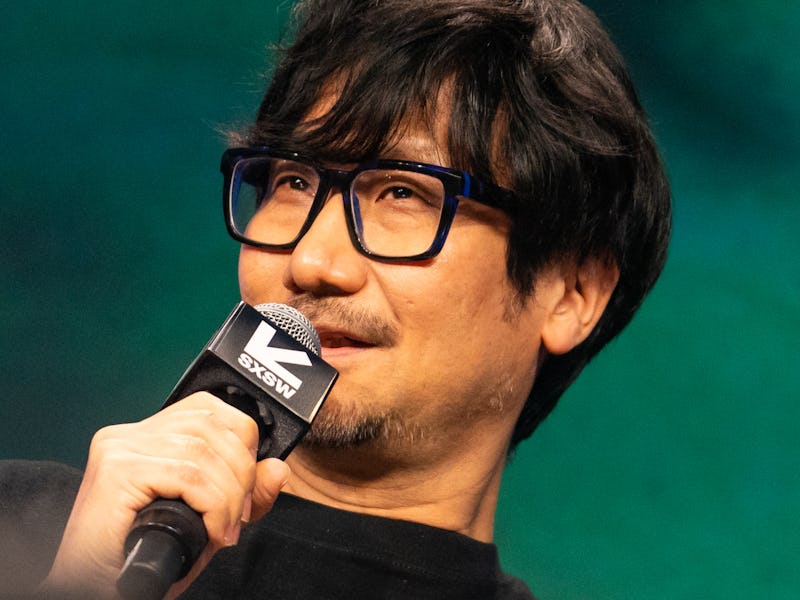
In the starting hours of video game auteur Hideo Kojima’s Death Stranding, things get weird quickly. You’re on a mission for the president of what’s left of the United States and you’re tasked with transporting a corpse to the incinerator, but every time you shimmy too much weight to one side, your character can easily fall over.
It’s the first few moments of story setup and world placement that Kojima carefully designed, and depending on whom you ask, it’s either brilliant or baffling. That’s exactly the sort of reaction Kojima often garners with his art, where he’s always trying to push the envelope, whether it’s in gaming — or in a recent collab with Uniqlo’s sister brand, GU, with Death Stranding branded fashion. But the artist has a weird paradox of accidentally being too popular when he’s trying to be provocative. Now onto his sophomore title after founding his own company Kojima Productions, leaving behind Metal Gear partner Konami, the 61-year-old has shown no signs of taking it easy.
“Most games are easy recently — they don’t give you challenges,” Kojima tells Inverse. “But people will understand why they’re facing hardship.”
“People don’t understand me at all, even when I was at Konami.”
Although Kojima got his start in the video game industry decades ago with Metal Gear and Konami, where he pioneered ideas like stealthily sneaking away from enemies instead of pummeling them head-on, he says that people still have trouble understanding his vision to this day. Conceptualizing such a weird thing like an artsy video game is tough for anyone before the final product comes together, and his team and cast members have simply learned to trust the genius, even if disparate parts and pieces seemingly make no sense in the process.
“I think it’s very strange if a game creator doesn’t express what they think in the game,” Kojima says. “It’s a big team, but the people who write the story — it’s not AI, it’s a continuation of their everyday life. When I write, I am looking at society.”
“People don’t understand me at all, even when I was at Konami,” Kojima says. “I’m trying to create something that doesn’t exist. When people don’t understand, I can’t show what’s in my brain. I can draw it, but people don’t understand because games are about experience.”
In the early days of Metal Gear, people were used to action games about shooting things, not about sneaking around. When Kojima brought up the idea of stealth, people responded saying that it sounded stressful, as nobody would want to hide. When Kojima pitched Death Stranding as a delivery game that doesn’t let people skip the walking portion, the idea was an alien one, too.
“But people who have been with me for a long time will join me,” Kojima says. “Even if they don’t understand, they say, ‘I don’t understand you, but we’ll follow you because we know you’re onto something.’ New people are afraid. It’s unavoidable ... Not everyone can fully understand. But that’s all right.”
In the years that have followed the game’s launch as a PlayStation exclusive, it’s been ported over to multiple platforms and consoles, and received critical acclaim. But within all of the praise lies worry. In an interview with Edge magazine, Kojima has even said that he’s apprehensive about initial reviews of Death Stranding 2 being too positive as he isn’t motivated to make something that appeals to everyone. He’s more interested in making something different that, again, challenges people.
“People don’t understand me at all, even when I was at Konami,” Kojima says. “I’m trying to create something that doesn’t exist. When people don’t understand, I can’t show what’s in my brain. I can draw it, but people don’t understand because games are about experience.”
Life imitates art
Death Stranding drew attention in 2020 for seemingly predicting people’s growing reliance on delivery services, social isolation, and persistent need for human connection. Its themes appeared to be eerily prophetic. Kojima maintains that the accuracy of his predictions wasn’t intentional, and merely a byproduct of his creative process.
“When I write, I am looking at society.”
“I think it’s very strange if a game creator doesn’t express what they think in the game,” Kojima says. “It’s a big team, but the people who write the story — it’s not AI, it’s a continuation of their everyday life. When I write, I am looking at society.”
He continues, “There are many questionable things in this day and age, and those themes naturally make their way into the game, because I create the characters and how they think or what they say. My way of thinking gets incorporated.”
In the original Death Stranding, Kojima wanted people to say thank you to people who deliver things and to appreciate porters as everyday heroes. As for the sequel, he’s mum on many details for now, besides saying he’s presenting a lot of hardships at the start of the game.
“People don’t need to know my thinking; they can just enjoy it naturally,” Kojima says of Death Stranding 2.